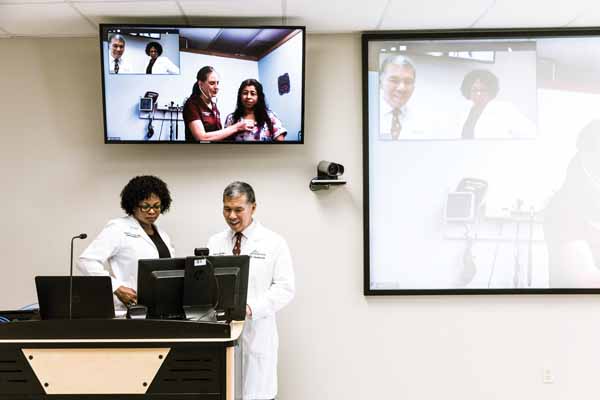
The federal government recently granted Texas $3.3 billion – the largest award of any U.S. state – to deploy and upgrade broadband networks, critical to ensuring access to telehealth care.
The funding stems from the Infrastructure Investment and Jobs Act, a $1 trillion bipartisan law that President Joe Biden signed in November. Its provisions included the creation of the Broadband Equity, Access, and Deployment (BEAD) Program, which aims to expand access to affordable, high-speed internet service.
In May, the Texas Medical Association joined the Texas Broadband Development Office’s (TBDO’s) Health Task Force, which advises the office on BEAD program planning, including troubleshooting barriers to broadband expansion. The federal grant also builds on years of progress at the state level.
Thomas Kim, MD, a member of TMA’s Council on Science and Public Health and the association’s Committee on Behavioral Health, is “super excited” about the award, which he says will support countless industries and demographics. Dr. Kim serves on the Texas Governor’s Broadband Development Council.
“This investment is so much bigger than just improving health care, which it will by connecting more doctors to more patients in more places,” the Austin psychiatrist told Texas Medicine Today.
Texas’ grant is proportional to its need: Roughly seven million Texans across 2.8 million households lack broadband access, according to TBDO.
“While this funding exceeds the amounts allocated to any other state or territory, it also means Texas has the most unserved addresses in need of reliable connectivity, and more work is required to close the digital divide,” TBDO wrote in a June 29 announcement.
The scale of Texas’ broadband need isn’t the only challenge – Dr. Kim says the state has hard work ahead of it. Texas must map its broadband deserts, create a disbursement process, and ensure any resulting broadband service is affordable for Texans in need.
“Access to a particular resource like broadband internet is not a guarantee that there will be meaningful utilization,” he said.
But Dr. Kim sees these challenges as opportunities and notes that broadband expansion must be supported by industry-specific regulatory changes at the state level.
For instance, he cites pandemic-era flexibilities such as telehealth payment parity, which incentivizes physicians to continue offering virtual services by paying for them at the same rate as in-person visits.
“To continue to treat telehealth care as something different than conventional health care is a mistake,” he said. “So long as [physicians] meet the regulatory expectations, it should not matter how care is delivered.”
At the state level, the recent passage of House Bill 9 by Rep. Trent Ashby (R-Lufkin) proposes a constitutional amendment – due to go before voters in November – that would create a $1.5 billion Texas Broadband Infrastructure Fund, supplementing the $3.3 billion in federal grant.
And, during the 2021 session, the Texas Legislature passed:
- House Bill 4 by Rep. Four Price (R-Amarillo), which made permanent pandemic-induced allowances for expanded telemedicine payment in Medicaid and the Children’s Health Insurance Program, if the state determines those services are clinically sound and cost-effective; and
- House Bill 5 by Representative Ashby, which established the TDBO.
Michelle Romero, TMA’s associate vice president of legislative affairs, says these developments work in tandem to expand access to high-quality, physician-led care by easing the use of telehealth and remote monitoring services, especially in rural and underserved areas hit hardest by Texas’ physician workforce shortage.
With the grant awarded, TBDO now must submit a proposal to the National Telecommunications and Information Administration detailing its BEAD-funded programs. The state agency says it will solicit public feedback in the drafting of this plan, and Texas Comptroller Glenn Hegar expects TBDO will accept applications for BEAD funding in 2024, according to a June 29 news release.
For more information, check out TMA’s
Telemedicine in Texas webpage.
Emma Freer
Associate Editor
(512) 370-1383